Yes, your Bitcoin wallet can be hacked, especially if you're not careful. Weak passwords and unpatched vulnerabilities make you a target for brute-force attacks, where hackers use powerful tools to guess your password. Hot wallets, connected to the internet, are particularly at risk. To protect yourself, always use long, complex passwords and enable two-factor authentication. Regularly back up your wallet's private keys to a secure location, and consider using offline cold wallets for long-term storage. Understanding these risks can keep your assets safe, and there's much more to learn about fortifying your security measures.
Key Takeaways
- Wallets with weak passwords are highly vulnerable to brute force attacks, allowing hackers to systematically guess passwords with powerful tools.
- Strong, unique passwords of at least 15 characters significantly reduce the risk of being hacked through brute force methods.
- Two-factor authentication (2FA) provides an additional security layer, greatly diminishing the likelihood of unauthorized access to wallets.
- Regularly updating passwords and using password managers can help maintain strong security against hacking attempts.
- Cold wallets offer better protection against hacking compared to hot wallets, as they are not connected to the internet.
Wallet Security Fundamentals
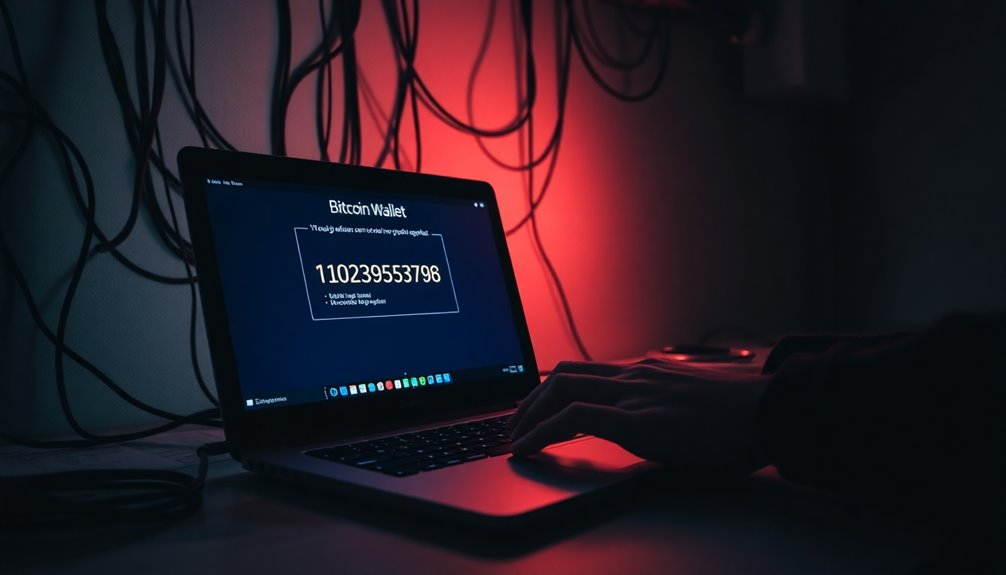
When it comes to securing your Bitcoin wallet, understanding wallet security fundamentals is vital.
Start by regularly backing up your wallet's private keys or seed phrase in a secure, offline location. Keep multiple copies to guarantee recovery in case of loss, and encrypt these backups for added security. Additionally, periodically verify the integrity of your backup copies to ensure they are still accessible and secure.
Use strong, unique passwords for your wallet accounts, avoiding easily guessable information. Enable two-factor authentication (2FA) to add an extra layer of protection during logins and transactions.
Keep your wallet software and operating system updated to apply security patches.
Finally, consider using hardware wallets for offline storage, assuring your private keys remain protected from online threats.
Understanding Wallet Vulnerability Risks
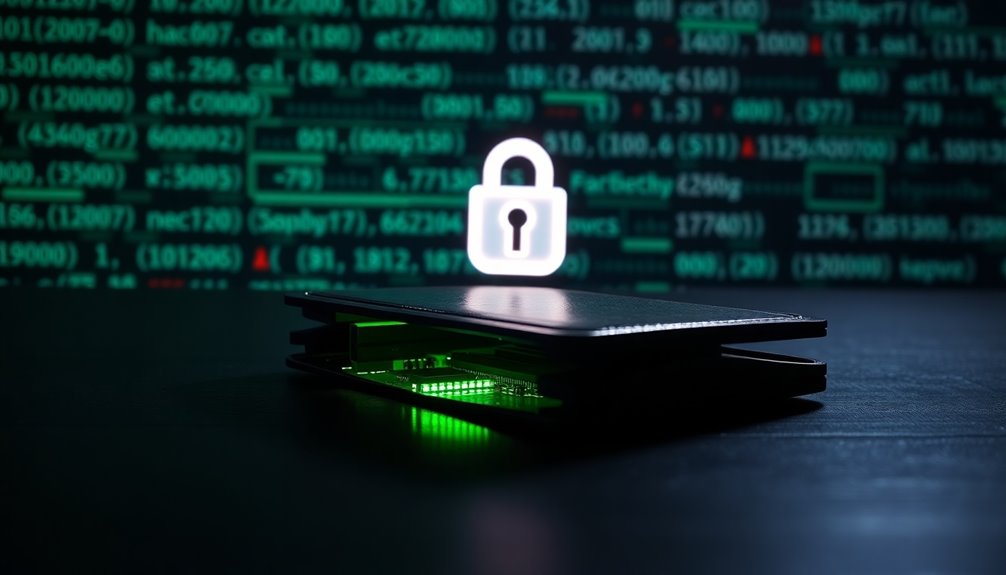
Understanding wallet vulnerability risks is vital for anyone involved in cryptocurrency, especially given the evolving landscape of security threats.
Historical vulnerabilities, like the BitcoinJS flaw, show how outdated randomization can leave your wallet exposed. If you created a wallet between 2011 and 2015, you're at heightened risk due to the Randstorm flaw, which compromised key generation. Millions of wallets are at risk due to the ongoing use of vulnerable functions in active services. Moreover, the rise of pump and dump schemes in the crypto market underscores the importance of securing your investments against potential fraud.
Current vulnerabilities, such as the BitForge issues discovered in 2023, highlight the urgent need for vigilance. Wallets from major providers like Coinbase and Binance have been affected, allowing attackers to drain funds undetected.
It's important to stay informed about these risks and guarantee your wallet is updated and secure, as many vulnerabilities remain unpatched and can put your assets in jeopardy.
Brute Force Attack Mechanics

Wallet vulnerabilities can lead to various attack methods, one of the most common being brute force attacks. In a brute force attack, hackers systematically try all possible password combinations until they find the right one. By using scripts and powerful GPUs, they can attempt billions of combinations in mere seconds.
This poses a significant threat, especially to hot wallets that rely on weak passwords. Hackers can also exploit vulnerabilities in your computer through viruses to access your hot wallet directly. Given that the Bitcoin blockchain has never been hacked, unlike many centralized systems, the need for robust personal security measures becomes even more critical.
Unlike cold wallets, which are offline and protected by complex seed phrases, hot wallets offer less resistance, making them prime targets for these attacks. To enhance security, consider using strong passwords and enable two-factor authentication (2FA).
Pros and Cons Analysis

How can you weigh the pros and cons of different wallet types in the context of security?
When considering security, implementing two-factor authentication (2FA) is a significant pro for wallets that support it, greatly reducing brute-force attack risks. Strong passwords and offline storage also enhance security. However, hot wallets, while convenient, are more exposed to hacking due to their internet connection and often lack 2FA. On the other hand, cold wallets offer robust protection through complex seed phrases and offline operation, making brute-force attacks impractical. Additionally, the rising cyberattacks on wallets highlight the critical need for users to evaluate their wallet security measures. According to experts, utilizing a trusted custodian for IRA management can further enhance the security of your cryptocurrency investments. Exchange wallets tend to have vulnerabilities, such as common passwords and linked email access, which can be exploited. Balancing these factors helps you choose the right wallet for your needs.
Wallet Types: Security Differences

When choosing a cryptocurrency wallet, it's essential to recognize the significant security differences among various types.
Hot wallets, always connected to the internet, are more vulnerable to hacking and phishing attacks, often relying on simple password protection.
In contrast, cold wallets operate offline, providing superior security with hardware-based solutions and complex seed phrases, making brute-force attacks impractical. As a result, cold storage is often recommended for users prioritizing security over convenience.
Hardware wallets stand out for their physical security and user-friendly interfaces, combining the benefits of cold storage with enhanced features.
Non-custodial wallets grant you full control over your private keys and prioritize privacy, reducing third-party risks.
Ultimately, understanding these distinctions helps you make informed decisions about your wallet's security.
Brute Force Attack Implications
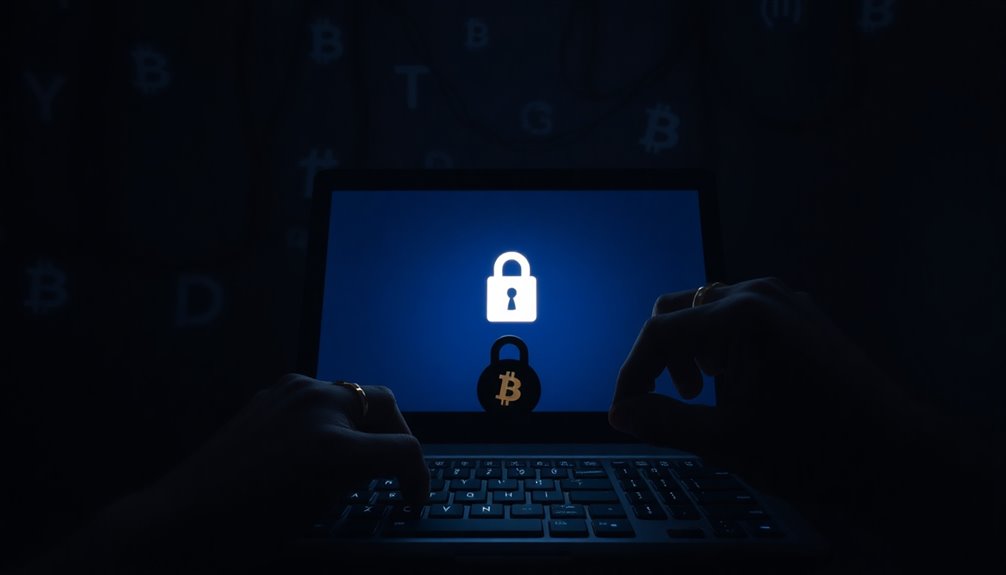
Although Bitcoin's cryptographic security is robust, certain vulnerabilities, like the Randstorm flaw, can still make brute force attacks a potential threat.
Discovered in January 2022, this vulnerability primarily affects wallets created between 2011 and 2015, especially those before March 2012. The issue lies in the BitcoinJS library's SecureRandom() function, which produced keys with insufficient randomness. This flaw has left an estimated 1.4 million BTC at risk due to the affected wallets. While brute-forcing a 256-bit key remains impractical, attackers can exploit this vulnerability if they possess the right data from wallet generation. This could expose millions of wallets to risk, with about 3-5% potentially vulnerable.
If you have an affected wallet, it's essential to transfer your assets to a new, securely generated wallet to safeguard your funds.
Recent Hacking Incident Reports
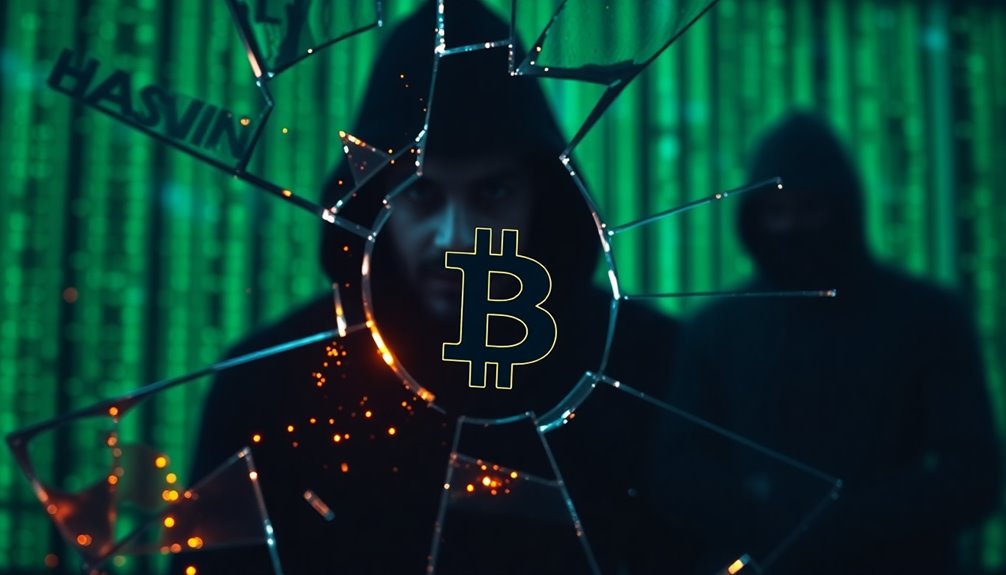
Recent hacking incidents have raised significant concerns within the cryptocurrency community, highlighting vulnerabilities that can lead to substantial financial losses.
In June 2024, exploits like price manipulation and the UwU Lend hack resulted in losses exceeding $1.8 million, suggesting ties to earlier attacks. Additionally, the significant hacks earlier in the year, such as the Abracadabra Finance incident, further emphasize the ongoing threat to digital assets.
CoinsPaid faced a $7.5 million breach, where hackers made unauthorized withdrawals and exchanged tokens, possibly linked to the Lazarus Group.
Additionally, the Randstorm vulnerability exposed outdated functions affecting wallet key generation, putting millions at risk.
The DMM Bitcoin heist involved North Korean hackers stealing $308 million through social engineering tactics.
These incidents showcase the urgent need for enhanced security measures to protect your assets in an increasingly perilous digital landscape.
Use Long, Complex Passwords
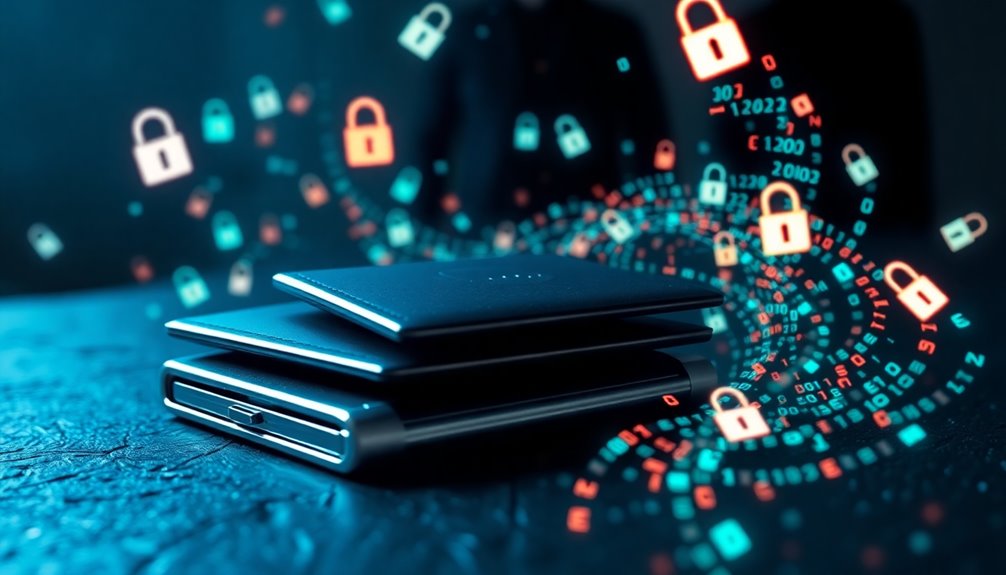
To safeguard your Bitcoin wallet from hacking attempts, using long, complex passwords is essential. Aim for at least 15 characters, mixing uppercase and lowercase letters, numbers, and symbols. This complexity greatly increases security, making it harder for hackers to crack your password through brute-force or dictionary attacks. Remember, an 8-character password can be compromised in hours, while a 15-character one takes much longer. As technology advances, including quantum computing, the need for stronger passwords becomes even more critical. Avoid reusing passwords across accounts and change them regularly to enhance security. Additionally, consider utilizing a crypto wallet passphrase for an added layer of protection, ensuring your Bitcoin holdings remain secure. Finally, consider implementing two-factor authentication for an added layer of protection, ensuring your Bitcoin holdings remain secure.
Frequently Asked Questions
Can I Recover My Bitcoin if My Wallet Is Hacked?
If your wallet's hacked, recovery is possible depending on the security measures you took.
You can use your seed phrase to restore access, ensuring you enter it correctly. If you have your private key, that can also help, but be cautious with it.
Alternatively, if you've created backups, you can restore from there.
Specialized recovery services might assist as well, but costs can vary, so weigh your options carefully.
What Are the Signs of a Wallet Being Compromised?
Think of your wallet as a secure treasure chest. If you notice unusual transactions, like unexpected withdrawals or deposits, it might be a sign that someone's picked the lock.
Keep an eye out for login attempts from strange devices or changes to your settings that you didn't authorize. If you receive alerts from your wallet provider about potential breaches, take them seriously—it's your treasure at stake!
How Often Should I Change My Wallet Password?
You should change your wallet password regularly, especially if you frequently access it.
If you suspect any risk, like unauthorized access or software vulnerabilities, change it immediately.
For hot wallets, frequent updates are essential, while cold wallets with strong, randomized seed phrases don't require as much attention.
Additionally, consider implementing two-factor authentication and using strong, unique passwords to enhance your security.
Staying proactive helps protect your assets effectively.
Are Hardware Wallets Immune to Brute Force Attacks?
Imagine your treasure chest hidden deep in a cave, guarded by a complex lock only you can open.
That's how hardware wallets work against brute force attacks. They store your private keys offline, making them virtually invisible to hackers.
With long, complex seed phrases and encrypted PINs, it's like adding layers of security.
While no system's completely immune, hardware wallets greatly reduce risks, keeping your digital treasure safe from prying eyes.
Can I Use Biometrics for Extra Wallet Security?
Yes, you can use biometrics for extra wallet security.
Biometric wallets utilize fingerprint scanners, facial recognition, or iris scans to verify your identity, adding a strong layer of protection. They record your unique biological patterns and store them securely.
When you attempt to access your wallet, the system quickly matches your live data against the stored template. This method isn't only fast but also highly accurate, making it an effective security measure.
Conclusion
In summary, while the idea of your Bitcoin wallet being hacked might seem far-fetched, it's essential to stay vigilant. Did you know that about 20% of all Bitcoin wallets are believed to be at risk due to weak passwords? By using long, complex passwords and understanding the mechanics of brute force attacks, you can greatly enhance your wallet's security. Don't take chances—protect your investments and keep your crypto safe from potential threats!









